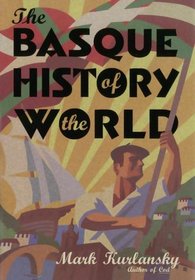The Basque History of the World by Mark Kurlansky
Review by jjares
It doesn’t take long to understand that the Basques have affected world history far beyond what their small numbers would suggest. The Basques are Europe’s oldest nation, although they are not a single nation but spread over parts of Spain and France. Their land area is slightly smaller than New Hampshire. Their Euskera language is an isolate (unrelated) to any other European (or other country’s) language. Even the Basques have no idea of their origins.
The author is quite taken with the Basques; his book discusses the Basques’ influences in the world alongside the occasional Basque recipe. Mark Kurlansky is an accomplished journalist and has an eye for detail. Kurlansky’s question is: How did such a small Basque population profoundly affect the world?
A few of the Basque attributes, innovations, or creations:
– Espadrilles (lace-up shoes),
– First to play sports with balls,
– Created jai alai game,
– First Europeans to cultivate tobacco,
– First Europeans to eat chili peppers and corn,
– Basques were the second Europeans in the Americas (Vikings were first),
– Basques were great shipbuilders and sailors.
– Many Basques accompanied Columbus and other early explorers.
– Over 50% of the Basques have 0 blood.
– Over 50% have Rh-negative blood.
– This accounts for their small populations until recent times.
– The Basques invented beach resorts and racing regattas.
The Basques are firm believers in capitalism. Generations ago, they broke the Dutch control of chocolate. This caused the price to drop significantly, but the Basques used that to create a larger market for the product. When the Dutch sold it, only the very wealthy could afford it. The Basques made it available to more people. The Basques introduced banking and capitalism to Southern Europe.
The most famous Basque was St. Ignatius Loyola, who formed the Jesuit religious order; they specialized in missionary work. Today, the Basques are vital Catholics (the most devout in Europe). A strong network of Basque-speaking parish priests serves them. The Basques are family-oriented and seem clannish because they operate in a weak government, which forces them to rely on each other, not the government.
Kurlansky points out that Spain would slip into a third-world region without Catalan and Basque productivity. The last few chapters explained in great detail the Spanish Civil War and the years of Francisco Franco. Those years were devastating for the Basques. However, since Franco died in 1975, the Basques have enjoyed a resurgence.
Because the Basques were early adopters of industrialization, they had jobs and did not have to migrate out of their homeland or assimilate with other cultures. Once Franco was gone, the Basques slowly reinstated their cultural policies. Although there are still seven dialects of their language, in the 20th century, they created a single written language. As a result, there has been an explosion in Basque literature and culture.
This book answers everything you’ve ever wondered about the Basques. It is a fascinating history of a small group of people, united by language, culture, and religion, which have lasted longer than just about any other culture on earth.


